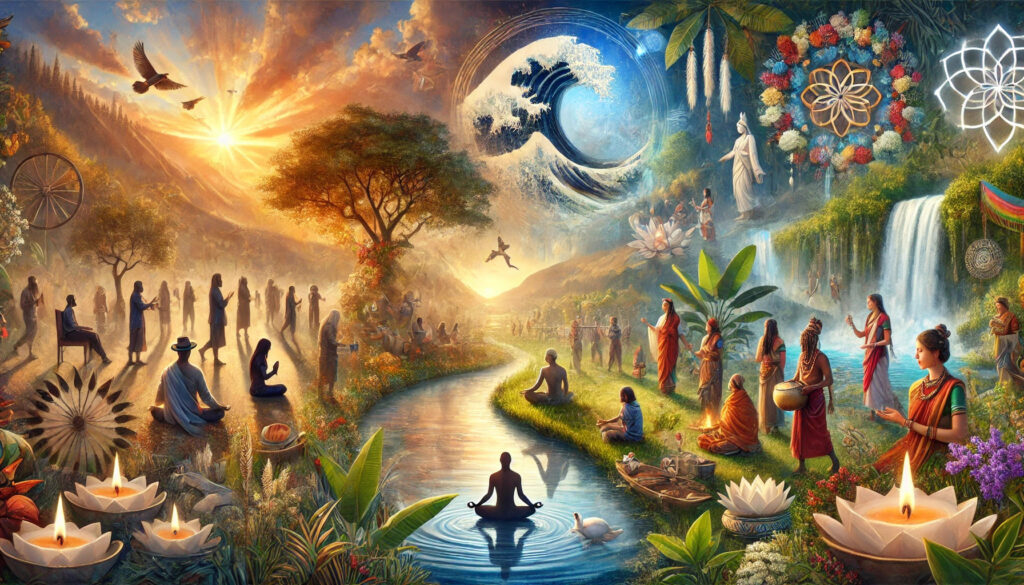
Gratitude, the act of appreciating what one has, forms a core principle across a vast spectrum of faiths and wisdom traditions. In a world often consumed by desires and anxieties, practicing gratitude reminds us of the richness that already surrounds us. As we focus on the abundance in our lives rather than on what we lack, an inner shift in consciousness can occur providing a wonderful blueprint for the future. The practice of gratitude cultivates happiness, strengthens communities, and fosters a deeper connection with the divine. As Cicero, the Roman philosopher, remarked, “Gratitude is not only the greatest of virtues, but the parent of all the others”
Henri J. M. Nouwen summarises it beautifully “Gratitude as a discipline involves a conscious choice. I can choose to be grateful even when my emotions and feelings are still steeped in hurt and resentment. It is amazing how many occasions present themselves in which I can choose gratitude instead of a complaint. . . . The choice for gratitude rarely comes without some real effort. But each time I make it, the next choice is a little easier, a little freer, a little less self-conscious. . . . There is an Estonian proverb that says: “Who does not thank for little will not thank for much.” Acts of gratitude make one grateful because, step by step, they reveal that all is grace.In the space of vulnerability and awareness, we cultivate the purest form of gratitude. To be fully connected to life is to embrace all of it—its light and its dark—with a heart full of gratitude. Gratitude goes beyond the “mine” and “thine” and claims the truth that all of life is a pure gift
Many religions view life’s blessings as gifts from a higher power. Gratitude is a way to acknowledge and appreciate these gifts. The Abrahamic traditions, Judaism, Christianity, and Islam all emphasize gratitude towards God. In Judaism, gratitude is woven into daily life through prayers and rituals. The Modeh Ani, a morning prayer, is a daily expression of thanks to God for the gift of life. Gratitude in Hinduism is expressed through rituals, prayers, and offerings (Puja), and Aarti(devotional song). In Buddhism, gratitude is linked with the cultivation of positive mental states and the development of compassion. It is seen as an essential aspect of the path to enlightenment. In Taoism, gratitude is an acknowledgment of the balance and harmony of the Tao. It is a recognition of one’s place within the natural order and an appreciation for the simplicity and flow of life.
Indigenous traditions often express gratitude through rituals and ceremonies. Native American tribes acknowledge the interconnectedness of all things, offering thanks to the earth, the spirits, and the community for their sustenance. Similarly, African religions celebrate life’s blessings through harvest festivals and offerings to ancestors, expressing gratitude for their guidance and protection.
When we express gratitude, we acknowledge the interdependence of human existence and create a more positive and supportive community. Finally, gratitude fosters a deeper connection with the divine or the source of existence, depending on one’s belief system. By acknowledging the blessings in our lives, we recognize a power greater than ourselves. This sense of humility and appreciation can be a powerful source of inner peace and spiritual growth.
Poets and Philosophers
“Let gratitude be the pillow upon which you kneel to say your nightly prayer.” Maya Angelou
“Count your blessings and you will have an attitude of gratitude.” John Marks Templeton
“There are two kinds of gratitude—the sudden kind we feel for what we receive; and the larger kind we feel for what we give.” Edwin A. Robinson
Abrahamic Traditions:
- Islam: “And be grateful to Allah, for if you are grateful, He will surely increase you [in favor]” (Quran 14:7)
- Judaism: “Give thanks to the Lord, for he is good; his love endures forever.” (Psalm 107:1)
- Christianity: “Give thanks in all circumstances; for this is God’s will for you in Christ Jesus.” (1 Thessalonians 5:18)
Eastern Religions:
- Hinduism: “He is a miserable person who does not find happiness in his own home.” (Yajur Veda)
- Buddhism: “Gratitude is the source of many virtues.” (Dhammapada)
- Taoism: “Being content with what you have is the greatest riches.” (Lao Tzu)
Indigenous Traditions:
- Native American Proverb: “Let us be grateful to the ancestors for giving us life; let us be grateful to the Earth for giving us food; let us be grateful to the Great Spirit for giving us all.”
- African Proverb: “If you want to go fast, go alone. If you want to go far, go together.” (Expresses gratitude for community)
Other Wisdom Traditions:
- Stoicism: “It is not that we have a short time to live, but that we waste a lot of it. Life is long enough, and a sufficiently generous amount has been given to us for the highest achievements if it were all well invested.” (Seneca)
- Epicureanism: “He who does not consider himself fortunate after he has dined with a friend has not experienced what friendship is.” (Epicurus) (Expresses gratitude for simple pleasures)


